
Guests
- Craig Renauddirector and producer of Armed Only with a Camera, which tells the story of his brother, the photojournalist Brent Renaud, who was shot and killed by Russian soldiers in 2022 while covering the invasion of Ukraine.
- Juan Arredondoeditor and producer of Armed Only with a Camera.
Armed Only with a Camera, the documentary chronicling the life of the late filmmaker Brent Renaud, premieres Tuesday on HBO. Renaud was the first Western journalist killed during the war in Ukraine. He was shot by Russian soldiers during the 2022 invasion while filming Ukrainian refugees with another photojournalist, Juan Arredondo, who was wounded in the attack. Armed Only with a Camera, directed by Renaud’s brother Craig, also a filmmaker, traces Brent Renaud’s long career covering conflict and post-conflict regions around the world. We speak to Craig Renaud and Juan Arredondo about Brent’s work and memory. “He was a very compassionate person,” says Renaud, emphasizing that Brent’s focus on conflict zones “was never about just trying to get to the frontlines … He wanted to humanize the people that were there.”
Transcript
AMY GOODMAN: This is Democracy Now!, democracynow.org. I’m Amy Goodman, with Juan González.
Armed Only with a Camera. That’s the name of a new HBO documentary about the filmmaker Brent Renaud. He was the first Western journalist killed by Russian soldiers in Ukraine in 2022. At the time, Brent was in Ukraine filming refugees for a documentary series. The Peabody Award-winning filmmaker was 50 years old. At the time of his death, he was with photographer Juan Arredondo, who was shot and wounded in that same attack.
Brent Renaud is a longtime filmmaker who had reported across the globe, including in Colombia, Mexico, Egypt, Somalia, Iraq, Libya, Haiti, China, Afghanistan and Pakistan. Much of his work was done with his brother and filmmaking partner, Craig Renaud. Craig is the director and producer of this new film.
This is the trailer. It begins with the Renaud brothers appearing on Democracy Now!
AMY GOODMAN: We’re joined by the Renaud brothers, Arkansas filmmakers.
CRAIG RENAUD: Brent, let’s go.
BRENT RENAUD: OK.
CRAIG RENAUD: Let’s go. Let’s get out of here.
When Brent told me that he wanted to be a documentary filmmaker, I followed my older brother to the most dangerous places in the world.
BRENT RENAUD: They’re locking in on us.
ANNA BOTTING: We’ve just got some breaking news: Brent Renaud, an American photojournalist, has been killed.
ANDERSON COOPER: Brent lost his life documenting the horrors on the battlefield in Ukraine.
JOHN KIRBY: The work that he was doing, the bravery with which he did it.
BRENT RENAUD: My name is Brent Renaud. This is my brother Craig. Besides my brother, I struggle to make friends. Autism tells you very little about a person. I can be calm as a Zen monk in a disaster zone.
Soldiers over there.
But the cocktail party in Brooklyn is absolutely terrifying.
CRAIG RENAUD: Brent was very intense and quiet.
UNIDENTIFIED: Can you put the camera down?
BRENT RENAUD: Yeah.
CRAIG RENAUD: He filmed on the frontline of conflicts —
SOLDIER: Aim. Fire!
CRAIG RENAUD: — all around the world. But what he cared about the most were the people caught in the middle.
BRENT RENAUD: Describe what you’re seeing.
UNIDENTIFIED: [translated] There are no terrorists here, only civilians.
SOMALI PATIENT: What is your name?
BRENT RENAUD: My name is Brent.
SOMALI PATIENT: The way you hold that camera, what you’re doing is from your heart.
AMY GOODMAN: The trailer to the new HBO film Armed Only with a Camera: The Life and Death of Brent Renaud, directed by Brent’s brother Craig. And this is an excerpt of Craig describing the moment when he heard from Juan Arredondo that Brent had been shot.
CRAIG RENAUD: So, he just kept repeating it. You know, “We’ve been shot. We’ve been shot. We’ve been shot.” And he — you know. And I said, “Where’s Brent?” And he said, “He’s been shot, too. I’ve been pulled away into a separate vehicle. He’s still there.” And I said, “Where was he shot?” And I said, “Did he have his vest on?” And he said, “Yes.” And then I said, “Was he shot in the — in the vest or the face?” And Juan paused. He didn’t answer me. And I knew right then Brent was gone.
AMY GOODMAN: That’s from Armed Only with a Camera: The Life and Death of Brent Renaud, and that’s Brent’s brother Craig, director of the HBO film, both colleagues of ours at Democracy Now! when we all were working at DCTV, at Downtown Community Television.
We’re also joined by the journalist Juan Arredondo, who was shot in that attack that killed Brent. Juan is also one of the film’s producers.
Craig and Juan, welcome back to Democracy Now! It’s great to have you with us, but terrible under the circumstances, though this is truly — this film is such a monument to your brother. Talk about the title, Armed Only with a Camera, and what happened exactly to Brent — and, Juan, of course, weigh in, because you were critically injured — on March 13th, 2022.
CRAIG RENAUD: Well, when Brent’s funeral took place, there was a eulogy given by our mentor, Jon Alpert, the founder of the Downtown Community Television Center, where he talked about Brent walking into these conflicts armed only with a camera. And that just felt very fitting for what Brent did. You know, he went to all the places around the world that you named, and only with a camera, trying to get to civilians caught in the crossfire.
AMY GOODMAN: And, Juan, can you describe that day?
JUAN ARREDONDO: Yes, Amy. We were — that was a Sunday, March 13th, and we were outside of Kyiv. We were going to Irpin. We wanted to get some footage of the people that were being evacuated from the outskirts of Kyiv and being evacuated into the west. And that morning, we had gone through several checkpoints. And when we got to the border between Kyiv and Irpin, there’s a very famous bridge there that had already been bombed. At that point, we got out of our car, and we walk, trying to get to see these refugees being evacuated.
And maybe 40 minutes into our walk, a car stopped by to just to say — to know where we were trying to head to. And we said we were going to between Irpin and Bucha. And we got in the car. I sat in the back of the car. Brent sat in the front. And maybe 15 minutes into the ride, we were ambushed. We were attacked by Russian troops.
I remember, from the corner of my eye, I can see from the window, from the trenches, two soldiers, but the one closer to the road had an AK-47 and aimed the AK-47 to our car. And I yelled we were getting shot. I ducked and tried to get some protection on the bottom of the car. And then the driver made a U-turn and put us in the crossfires of this, what we think is a handful of Russian troops. And maybe — it felt like an hour, but it must have been maybe a couple of minutes. And the car broke down. And when I finally got up from the floor, I could see Brent bleeding and with a big wound on his neck. I was shot on the — on my back. And the car stopped.
We took Brent out of the car, laid him on the ground. And by that time, I was bleeding and fainting. Another car came. They had a relay system of every 15 minutes coming to evacuate civilians. And so, the driver made the decision of thinking, well, the worst that can happen is wait 15 minutes. Luckily for me, five minutes passed, and then the car took me and evacuated me. Brent, at that point, we believe, was already dead.
JUAN GONZÁLEZ: And, Craig, you and your brother had talked about what to do if anything happened to either of you while covering a war zone. What did you discuss? And what made you decide to make this film?
CRAIG RENAUD: Yeah, we’d had that conversation many times. I remember in Iraq, we were heading into Iraq with the Arkansas National Guard, and the contractors had just been hung from a bridge in Fallujah, and the soldiers around us were scared about heading into Iraq. We were going to be passing right through Fallujah. And I remember having that conversation with Brent. You know, what if one of us are killed, or what if one of us are kidnapped? And the conversation was always that we keep filming, and we keep documenting, you know, what we’re there to do, which is to tell the story of these conflicts.
AMY GOODMAN: You’re, of course, from Arkansas, the two of you, from Little Rock.
CRAIG RENAUD: Yeah, we are.
AMY GOODMAN: I wanted to go to another clip from your film, Armed Only with a Camera. Brent Renaud is speaking to a Ukrainian woman whose house has just been bombed by Russia.
BRENT RENAUD: This doesn’t look good.
AMY GOODMAN: Destruction. We’re just looking at destruction, as the woman looks at her apartment and about, looks at the building. And we see Brent taking pictures.
BRENT RENAUD: Were you here when the bomb hit?
UKRAINIAN WOMAN: [translated] Yes, we were here, on the second floor on the other side. There were three explosions. Everything crashed down. The front door blown off. I can’t explain it. We are very scared.
AMY GOODMAN: Talk, Juan, about what you’re trying to capture there and when this was, and also what — I mean, you are contemporaries, you’re colleagues, but what you feel Brent taught you.
JUAN ARREDONDO: So, this is in a city about an hour away from Kyiv. It’s called Zhytomyr. And we were there because, in our way to Kyiv, we had seen some bombing happening. That is an apartment complex near a military base. What we were finding through our trip through Ukraine is that the bombings were not very accurate. They were hitting a lot of civilian houses, civilian complexes, and also hitting buses, train stations. And so, what we were trying to do is to witness what was happening there at the moment, trying to get the voices from the people who were being affected by this invasion in Ukraine.
And this is perhaps maybe about the sixth or fifth year that I was working with Brent and Craig. And graciously, they took me under their wing. Brent took me under his wing to teach me and to also work together in telling these stories. As a photojournalist, I always wanted to expand a little more into documentary filmmaking, and then Brent and Craig were gracious enough to bring me along. And so, that’s what we were trying to do then.
JUAN GONZÁLEZ: And, Craig, could you talk some more about the way your brother carried himself as a journalist in these different places? You have clips from his time in Iraq and Honduras, Somalia, Haiti, including the U.S. in Chicago, where he covered gang violence and its impact and the victims of gang violence.
CRAIG RENAUD: Well, we learned from Jon Alpert, you know, one of the best vérité documentary filmmakers that there is, and we started going to war zones with Jon soon after 9/11. And our approach was always pretty simple. You know, we just wanted to get to people and give them a voice and use our cameras to do that and document and put a human face to these — to the conflicts that were taking place.
AMY GOODMAN: Speaking of a human face, another clip from Armed Only with a Camera shows Brent talking to a 16-year-old teenager from Honduras.
BRENT RENAUD: Imagine being 16 years old, leaving home on your own and trying to make it all the way from Honduras to United States. Anthony, there’s all these dangers. This is not the normal kind of thing for a kid like you to be doing.
ANTHONY: [translated] I don’t have a father or mother. I’ve been alone since I was 10. I’d like to make this journey to the north to start a new family, God willing.
BRENT RENAUD: Anthony, be careful, OK? And we hope to see you again.
AMY GOODMAN: There’s [Brent], totally amazing, in Honduras, Craig, who when he was talking to a Somalian severely injured in Somalia, the man said to him the way that Brent carried himself as a journalist, that he was holding a camera with his heart, Brent, who, in — as an adult, was diagnosed with autism, being on the spectrum. Craig, what you want people to take away from this film, and how you lived with him, even in his death, by making this film?
CRAIG RENAUD: Yeah, you know, we just wanted people to understand Brent’s compassion. You know, he was a very compassionate person. And when he was going to war zones, it was never about just trying to get to the frontlines and cover conflict or soldiers shooting at each other. He wanted to humanize the people that were — that were there.
And that moment in Somalia was so powerful, because he was documenting one of the worst car bombs in Somalia’s history, in a hospital, and this man, who was severely burned from the car bomb, is watching Brent from across the room, calls him over and just says, “I can see you filming from the heart, and that means a lot.” And he said, “You and I, we can change the world, if we believe it.”
AMY GOODMAN: And, Juan, you were wounded with Brent as Brent lay dying. You grew up in Colombia. You lost your father, killed by drug cartels in Colombia. Your final message to people who watch this film tonight, premiering on HBO?
JUAN ARREDONDO: I think one of the takeaways is to — hopefully, people understand and appreciate the work that we do as journalists, as more and more we’re seeing attacks on our colleagues around the world. I hope that one of the messages that they take from this documentary is the close inside portrait of a brother, a family and the loved ones, what they go through when they lose a journalist, and what we lose in our democracy is what we lose when we lose a journalist. So, hopefully, that’s what people will take away from this.
AMY GOODMAN: And one of the most poignant moments at the end, when people are holding up pictures of journalists around the world who have died, particularly in Gaza, in that other conflict right now, where over 250 journalists have been killed.
I want to thank you both for being with us, Juan Arredondo, Craig Renaud. Craig is the director of Armed Only with a Camera: The Life and Death of Brent Renaud, Juan, the producer. It premieres tonight on HBO.
And that was it for our show. I’m Amy Goodman, with Juan González. Happy birthday, Robby Karran!

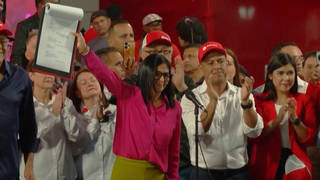
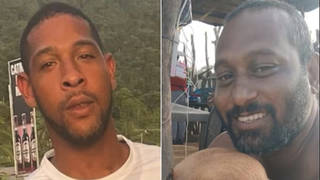
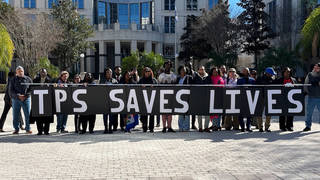
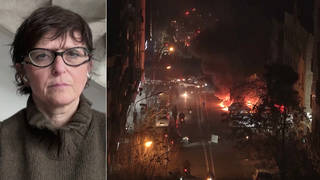





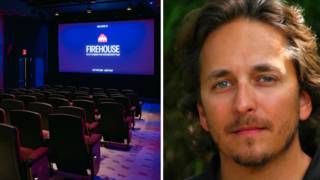

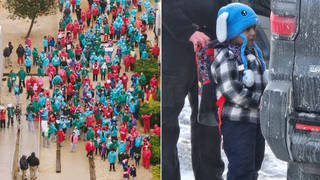
Media Options